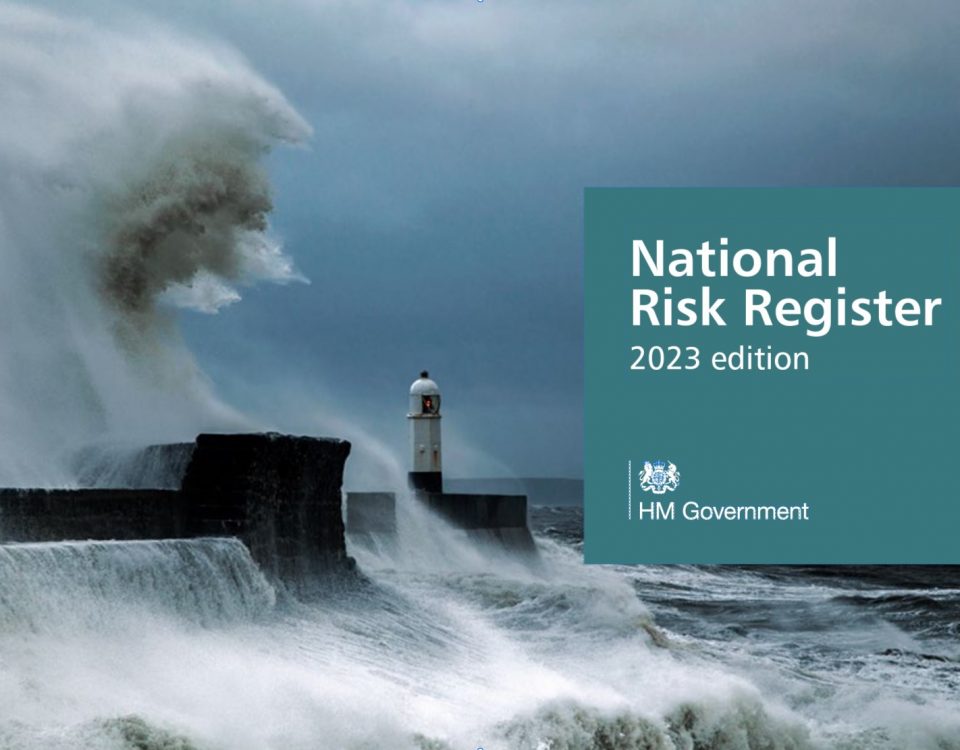Risk Management Insights

Ensuring Business Resilience: Strategies for Supply
26th May 2023
EV Charging: A Risk Management Guide
2nd August 2023Good morning and welcome to our Horizon Scanning newsletter.
The last month has seen us visit multiple events and deliver various services for our clients across many sectors. We have worked in Communications, Manufacturing, Food, FinTech, Higher Education and Insurance industries.
So that we can keep up with current risks and discussions this month, we have attended the DRI International (Disaster Recovery Institute) x UCL Institute for Risk and Disaster Reduction (IRDR) Colegent conference in London, Attended both the Chemical Industries Association Industry, CIRMagazine Business Continuity awards and the Airmic (Association for Insurance & Risk) conference 2023.
June also saw us celebrate the Employee Ownership Association Employee Ownership Day on the 23rd of June, 2023, the 11th annual EO Day!
Each EO Day, thousands of employee owners, EO businesses and supporters of employee ownership from across the UK come together to raise awareness of the benefits and impact of employee ownership.
Prizes, if you can guess, what made us laugh!
Our In The News section has more insights and valuable free tools to help support your business.
Thanks for reading, and stay safe.

Airmic Conference 2023 – Highlights and Key Insights
The 60th Airmic Conference 2023 brought together risk and insurance professionals to explore the industry’s future.
Artificial intelligence (AI) emerged as a critical theme, drawing attention from optimistic and pessimistic perspectives. Optimists have described AI as a way to encourage sustainability and innovation. But sceptics have raised concerns about its potential negative impact on jobs and inequality, distracting attention from the industry’s pressing needs.
Sustainability reigned supreme by emphasising the interconnectedness of risks on the front lines of climate change. Insurers, traders and consumers were urged to adopt sustainable practices and consider the broader environment in assessing and mitigating risks.
The need for better data was widely acknowledged, and discussions emphasised the value of more data for risk assessment. However, the industry faces challenges due to fragmented and dispersed data sources. Collaboration among stakeholders is needed to address these challenges and establish standardised data sources.
Collaboration emerged as an essential theme throughout the session. Industry stakeholders were encouraged to combine their skills, resources and insights to meet the complex challenges of a developing landscape, technological change and climate change. The collaboration was seen as crucial to driving innovation forward, increasing performance and enhancing resilience.
In the seminars, two areas covered regularly were the importance of scenario testing and the importance of Contingent Business interruption Insurance and where the risk industry may be heading when assessing these matters. This will be the focus of our newsletter this month.
Risk Management Insights: Safeguarding Your Business with Business Interruption Insurance and Scenario Testing
In today’s issue, we will explore the topic of Contingent Business Interruption (CBI) insurance and shed light on the significance of scenario testing in relation to risk management.
Contingent Business Interruption Insurance: Protecting Your Business
Businesses face numerous risks, including natural disasters, supply chain disruptions, or other unforeseen events that can severely impact operations. Contingent Business Interruption (CBI) insurance is designed to address the financial losses a business may experience due to interruptions in its supply chain or the operations of key customers.
CBI insurance typically covers losses arising from damage to a supplier’s or customer’s property, preventing them from fulfilling their obligations to your organisation. It can help mitigate financial losses resulting from supply chain disruptions, such as fires, floods, earthquakes, or even political instability that affects the smooth functioning of your business.
Scenario Testing: Unveiling Vulnerabilities and Enhancing Preparedness
To effectively manage risks associated with contingent business interruption, scenario testing plays a pivotal role. Scenario testing involves simulating potential disruptions and evaluating their impact on your business. Creating various hypothetical scenarios allows you to identify vulnerabilities, assess potential losses, and develop appropriate risk mitigation strategies.
Here’s why scenario testing is crucial for effective risk management:
- Identification of Vulnerabilities: Scenario testing allows you to identify weak links in your supply chain and evaluate the impact of potential disruptions. By assessing various scenarios, you gain a comprehensive understanding of your business’s vulnerabilities and can take proactive measures to strengthen your operations.
- Evaluation of Insurance Coverage: Through scenario testing, you can assess whether your current CBI insurance adequately covers potential risks. By considering various scenarios, you can identify gaps in coverage and make informed decisions about adjusting or expanding your insurance policies.
- Business Continuity Planning: Scenario testing serves as an essential tool for business continuity planning. By simulating disruptions and analysing their impact, you can develop robust contingency plans, establish alternative suppliers or customers, and implement measures to minimise downtime during unexpected events.
- Enhanced Risk Mitigation: Scenario testing allows you to evaluate the effectiveness of your risk mitigation strategies. By exploring different scenarios, you can determine the viability of existing measures and identify areas where additional safeguards are required.
Contingent Business Interruption Insurance: A Closer Look
Contingent Business Interruption (CBI) insurance protects businesses from financial losses resulting from disruptions in their supply chain or the operations of key customers. While traditional Business Interruption (BI) insurance covers losses caused by damage to the insured’s property, CBI insurance extends that coverage to include losses stemming from damage to the property of suppliers or customers.
Here are some key points to understand about CBI insurance:
- Coverage Scope: CBI insurance typically covers the financial losses a business incurs when it cannot operate normally due to disruptions at the premises of its suppliers or customers.
- Triggering Events: CBI insurance is triggered by specific events that cause property damage, preventing suppliers or customers from fulfilling their obligations. These events can include natural disasters, fires, floods, acts of terrorism, political instability, or other unforeseen circumstances.
- Loss Calculation: The calculation of losses covered by CBI insurance is typically based on the financial impact experienced by the insured business due to the disruption.
- Dependent Property Coverage: CBI insurance may include Dependent Property coverage, which protects against losses resulting from damage to the property of entities directly related to the insured business’s operations.
- Policy Limitations: It’s essential to review the terms and conditions of CBI insurance policies carefully. Coverage may be subject to certain limitations, such as predefined waiting periods before coverage starts, sub-limits on specific types of losses, geographic restrictions, or specific exclusions related to certain events or industries.
The Importance of CBI Insurance
Contingent Business Interruption insurance is vital in risk management for businesses with complex supply chains. Here are a few reasons why CBI insurance is essential:
- Supply Chain Resilience: Businesses today heavily rely on intricate global supply chains. CBI insurance provides a safety net by helping mitigate the financial impact of disruptions affecting suppliers or customers, enabling businesses to recover more swiftly and maintain their operations.
- Financial Protection: Disruptions in the supply chain can lead to significant financial losses, including lost revenue and increased expenses. CBI insurance provides financial protection by covering these losses, helping businesses avoid severe financial hardships and ensuring their long-term sustainability.
- Risk Transfer: CBI insurance allows businesses to transfer some of the risks associated with supply chain disruptions to the insurance provider.
- Enhanced Creditworthiness: Having CBI insurance coverage can improve a business’s creditworthiness and reassure lenders and investors that the organisation has taken proactive steps to manage its risk.
- Peace of Mind: CBI insurance provides business owners and management teams peace of mind. Knowing that they have coverage to handle contingent disruptions allows them to focus on other aspects of the business and make strategic decisions without worrying about potential supply chain risks.
Scenario Testing Best Practices
To make the most of scenario testing, consider the following best practices:
- Diverse Scenarios: Create a range of scenarios, including both probable and worst-case events, to cover a broad spectrum of potential disruptions.
- Data-driven Approach: Base your scenarios on reliable data, historical patterns, and industry insights to ensure realistic and accurate assessments.
- Collaboration: Involve stakeholders from different departments in the scenario testing process to gain diverse perspectives and promote a holistic approach to risk management.
- Regular Updates: Review and update your scenarios periodically to reflect changes in your business environment, supply chain, or industry dynamics.
- Learn and Adapt: Analyse the results of scenario testing exercises and use them as learning opportunities to refine your risk management strategies continually.
Businesses must assess their specific risk exposures and consider whether CBI insurance is appropriate for their operations. Consulting with insurance professionals and conducting thorough risk assessments can help determine the right level of coverage needed to protect against contingent business interruption risks.
Remember, an effective risk management strategy encompasses a combination of insurance coverage, proactive planning, and ongoing evaluation of supply chain vulnerabilities to ensure the resilience and continuity of your business.
In The News
There are several documents and resources relevant to the events we attended and spoke at, which might be worth browsing more fully:
- Ed Sheeran: Ipswich hacker who stole songs told to pay £100k
- Writer-director James Cameron on the importance of learning from past mistakes and warnings. – Titanic director James Cameron accuses OceanGate of cutting corners
- Has your business planned for the impact of a protest? – Just Stop Oil protesters interrupt start of second Ashes Test match at Lord’s
- New cyber security training packages launched to manage supply chain risk
- The Basic Business Interruption Book – Free Download
Thought for the week:
“Risk management is not merely about anticipating challenges but embracing proactive measures to protect your business. As you navigate the intricate web of supply chains, remember the power of Contingent Business Interruption insurance and scenario testing. By fortifying your resilience and preparing for potential disruptions, you pave the way for a future where your business survives and thrives in the face of uncertainty.
John Benfield




